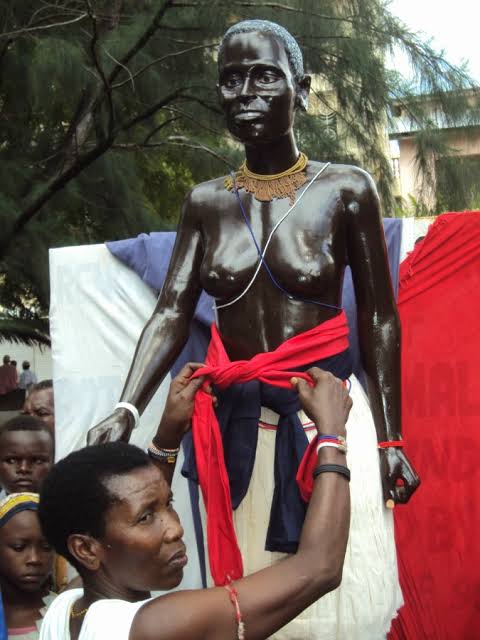She would try again, and this time she was convinced it would work, she was certain of it. Why wouldn’t it? Her cause was just and she believed whole-heartedly in Giriama traditions, the existence of God (Mulungu) and the power of ancestors to intercede in prayers for those who reached out to them with pure intentions. She managed to calm herself down, she had to be calm. Her previous attempts to reach out to the ancestors and Mulungu had failed, she adjudged, because she had reached out in anger and bitterness. Summoning those who came before you and left the land of the living was a sacred exercise. It was believed that depending on the nature of need, the ancestors could even manifest themselves in human or animal form to heed your call.
It was a distant land, she heard the name Kisii mentioned a few times along the way on that long, bumpy ride from Kilifi that she shared with Wanje wa Mwadori Kola on the back of a colonial-era truck, their hands and legs tied with sisal rope from the same sisal plantations the young men of the land were being overworked half to death. But she could identify with the land, after all, an African can not be a stranger in any part of Africa let alone within the borders of the Kenya Colony. Just as Mulungu manifested Himself in the ocean and trees back home at the Coast so would He be present in the hills, rocks and cold winds of Kisii. So she let go of all the bitterness, hate and pain and held on to the amulet tightly bound on her left arm. They had stripped all clothing and ornaments from her body but they had missed the amulet.
She took that as the first intervention by her ancestors, they knew she would need it, it was the only physical medium she had to her ancestral roots. She had it since the age she had began her menstruation, growing tighter and tighter around her arm year after year. It was tradition, her paternal grandmother had tied it around her arm, herself having received it from her grandmother before. She too would pass it down to her granddaughter, she was headstrong, despite all the present tribulations, she would live to see that day. They had made the amulet invisible to the eye of the white man, she believed.
“…Menza…Mnyazi…” she softly began naming her ancestors as she held on to her amulet, as the sacred ritual dictated, naming the ancestors one after the other followed by your plea. For she was Mnyazi wa Menza(Mnyazi daughter of Menza), named after her grandmother. She later became Mekatilili(Mother to Katilili). She took the prayer seriously, but even one as conscious of rituals as herself, couldn’t stop her mind wandering to her son, Katilili. Maternal instincts, they would understand. Katilili had himself grown into a decent man, despite losing his father at an early age, his uncles had deputised as very able father figures. He had the same capacity to accomodate his mother’s strong character and outspoken nature as his uncles Nzai, Hare and Mwarandu. There had been another uncle, Kithi, who they lost to the Arab slave trade. It’s the painful memory of this that fuelled Mekatilili’s stand against the white man.
The British had on top of taking over their land, imposing ‘hut tax’, overworking young men and children in sisal and rubber plantations now embarked on a drive to recruit the young men of the land to go and fight in a war (First World War) they knew nothing about. She was determined not to lose anyone else in her life in an unjust manner, and no one else from the Giriama tribe for that matter. It all culminated in her slapping Arthur Champion, the British administrator rallying the war recruitment call. In one of the meetings urging the youth to join “a cause of courage, honour and reward”, Mekatilili had shown up with a mother hen and her chicks. She dared him to pick one of mother hen’s chicks, which he bemusingly did. What followed was vicious pecks on his pale white legs by the mother hen, uncovered from him wearing a pair of knee-high khaki shorts. Arthur Champion had been so embarrassed by the laughter the act brought from the crowd that he resorted to shooting the mother hen.
The real-life parable put before him by Mekatilili had exposed him for who he really was and what the recruitment stood for. Anyone standing in the way of the recruitment would be terminated. Mekatilili slapped him across his cheek to make a stand, that just like the mother hen, she would be forced to react if any of the young men were taken from the land to go and fight a meaningless war. When Arthur Champion tried to strike back, the crowd charged towards him and his guards shot at the crowd. Many lost their lives that day. A sombre mood engulfed the Giriama people but even the grieving families understood it was a stand that had to be made.
The legend of Mekatilili which had been growing through the Kifudu dance that she danced across the villages to spread a message of unity, resistance and liberation only grew further. The Kifudu dance was a funeral dance, but this was as good a time as any, considering the severity of what was happening. She drew large crowds, her body glistening in sweat under the Coastal heat, dancing until her bare feet were sore. Mekatilili’s message was clear, the men of the land had to stand hand-in-hand with their women, if they were to overcome the white man and his greedy appetite for land and exploitation. It was clear to the British that she had to be stopped.
It was almost unheard of for a woman to be this outspoken. Almost. There had been one before, Mepoho. The woman many now believed Mekatilili to be the living reincarnate of. She was a seer among the Giriama people who foretold the coming of men with sisal-like hair in flying vessels and strange machines moving on land many years before the coming of the Christian missionaries Johann Ludwig Krapf and Johannes Rebmann. They would take the young men of the land with them and leave the daughters of the land trailing in their wake nursing and caring for half-pale babies with woolly hair, all the while eroding the culture of the Giriama people. Mepoho herself had made the prophesy during a spiritual dance, Ngoma za Pepo, after which the ground opened up and swallowed her, her work being complete. All this took place in present day Kaloleni shopping centre, Kilifi. Mekatilili always remained adamant that she was Mnyazi wa Menza, sister to Nzai, Hare, Mwarandu and Kithi. Mother to Katilili. No one else spectacular. Though humble to her own existence, the mystique around her weighed heavily in favour of the Giriama people against the white man, galvanising the resistance.
It was this heroic timeline of events that had led her and Wanje wa Mwadori Kola, the medicineman accused of administering oaths associated with the Kifudu dance, to be detained in Kisii. Those who took the oaths, vowed never to cooperate with the British. And it would be here in Kisii that Mulungu, from the intercession and mediation of Mekatilili’s ancestors thanks to the amulet, would heed her cry. Long before we became accustomed to singing the Christian hymn “Paulo na Sila waliomba,milango ya gereza ikafunguka”(Paul and Silas prayed and the prison gates opened), Mulungu also listened to Mekatilili, Mnyazi wa Menza. Only this time, she and Wanje wa Mwadori would find themselves miraculously ‘teleporting’ to a forest clearance away from the solitary cells of Kisii, for she had included him in her prayers as well.
They would walk all of 800 kilometers, maybe more, through thickets and bushes, tracing their way back to Kilifi, under the watchful care of Mulungu and their ancestors. No wild animal would do them harm. And so they arrived safely back in Kilifi, where if she thought she had safely banished the Mepoho comparisons, she would be in for a rude shock. Every new day came with a new version of the story. “They tamed an elephant and rode on it all the way from Kisii”…”No, she carried Wanje wa Mwadori Kola on her back and then they flew back home”.
She would go on to join the long line of ancestors, away from the land of the living, in the 1920s, almost a decade after her act of defiance. The British did stay, but lessened their labour demands on the Giriama people and lifted land restrictions. They would have nowhere near the bloody and repressive impact they would have elsewhere, and that is in no small part thanks to Mekatilili’s stance. In one resistance movement, Mekatilili imparted causes championing women’s and children’s rights, land rights and labour rights. We all owe a great debt to Mekatili, Mnyazi wa Menza.
The article is an enlivened account of the great things Mekatilili wa Menza achieved and was made possible by the timeline of events recorded by the National Museums of Kenya.
SUPPORT: We are a non-funded entity kept alive solely by our readers’ thirst for the undocumented and not adequately documented aspects of our past. The logistics of getting these stories can sometimes be a challenge. We would appreciate your support. To support Pwani Tribune’s history and culture research plus content creation…M-PESA till number: 8627478 Contact: +254726860693



